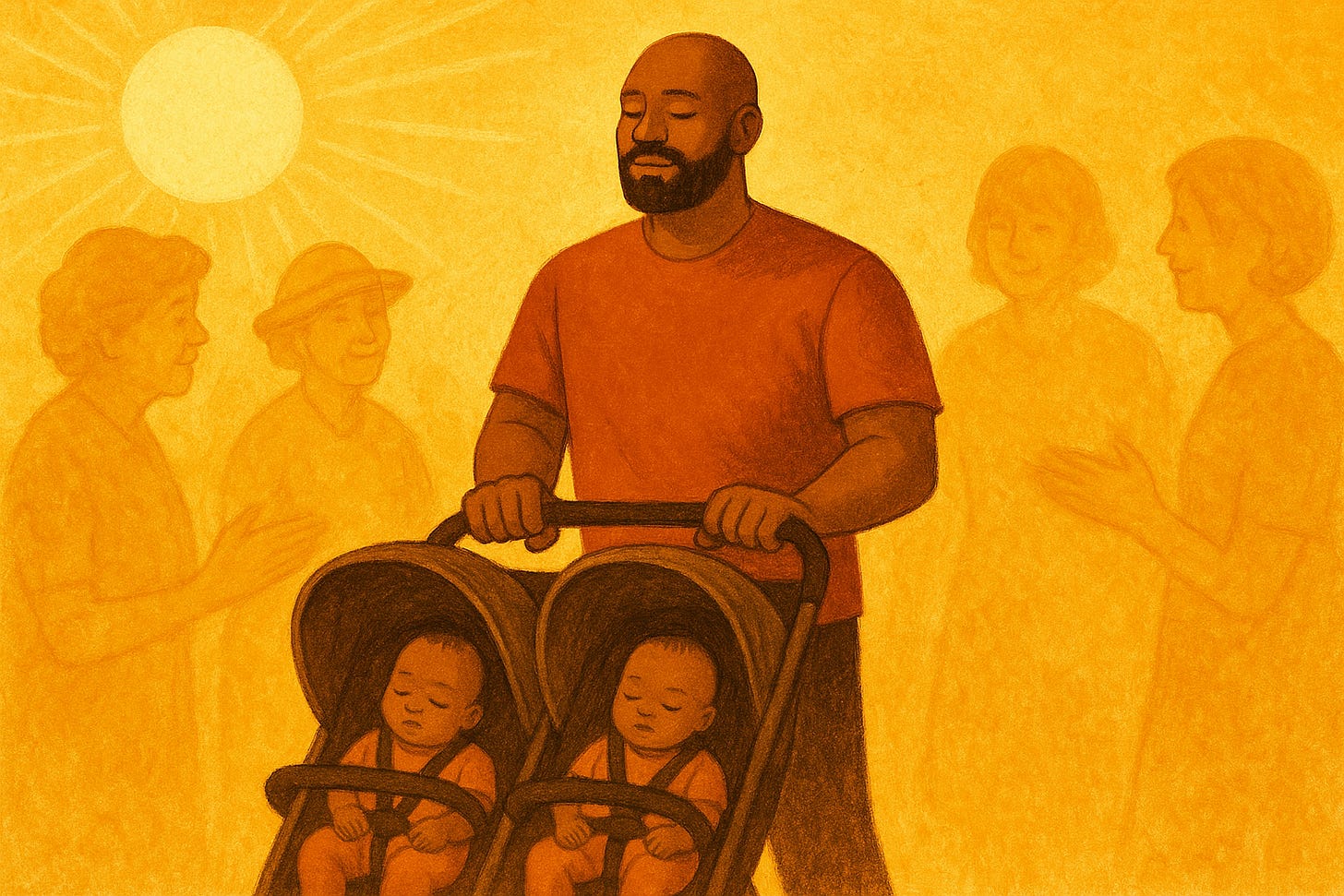When I Became a Father, I Finally Felt Seen
How becoming a father changed the way strangers see me as a Black man
Hi, I’m Jamaal. Welcome to Jamaal’s Letter, where I share insights, predictions, personal reflections, and strong opinions on the futures of markets, work, business, tech, and more.
The people who read this newsletter are the people who run the world. If you aren’t yet a subscriber, consider joining them by subscribing below. Please share it with your friends and colleagues if you find it helpful:
The sun was high, the fans were low on battery, and I was trying to keep the twins cool in their double stroller.
We had only just reached the edge of the shopping center when two elderly women, dressed in what looked like their Sunday best, stopped me. “How old are they? Oh my goodness, look at them! My daughter has a two-year-old. It’s so nice to see a father out with the kids. You don’t see that as often.”
What followed was ten full minutes of questions, compliments, and small talk. It was such a long and warm exchange that I eventually had to excuse myself to keep moving. The babies were still so young. So fragile. But even a short walk like that lightened the day.
I had been taking more walks like that as spring gave way to summer. My wife and I welcomed our twins last winter after six long years of trying to become parents. Our path included surgeries, failed IVF cycles, chemical pregnancies, and miscarriages. Ultimately, we turned to surrogacy. For a time, we considered that it just might not happen. We began to discuss adoption.
We still say out loud how surreal it is that the twins are here. That they are ours. That we get to raise them. That sense of awe and gratitude is always close by. And while the early months were full of sleepless nights and constant adjustments, I genuinely love being a father. People don’t talk enough about how much fun it is. I’m amazed by how much joy there is in watching them grow, develop, and become their own little people. Parenthood has expanded my capacity for love and given my life a new kind of meaning.
What I didn’t expect was how much it would also change how the world sees me.
I’m 6-foot-3, nearly 200 pounds, and Black. I’ve lived in some of the most diverse cities in the country, but most of my public life has felt like an exercise in invisibility. Not in the "ignored in meetings" kind of way. More like I was intentionally unseen. Gazes averted. Purses clutched. Silence in elevators. I often joked that the only place being a Black man benefits you socially is when you want a free seat next to you on the bus.
In graduate school, during a workshop where classmates gave unfiltered feedback, someone finally named it for me. “You’re intimidating,” they said. “You’re tall, you’re athletic. People aren’t going to come to you. You’ll have to go to them.” I was nearly 30 years old. It was the first time someone had said aloud what I’d long felt. That I gave off a kind of standoffishness I couldn’t fully control or explain. Part of it was mine. Part of it was society’s.
So I had made peace, in a way, with being invisible.
But now, when I’m with my twins, something shifts. When I push them along the river trail behind our house, almost everyone we pass smiles. Women of all ages stop to chat. People who once might have avoided eye contact offer compliments and advice. The double stroller is a dead giveaway, and something about seeing two babies seems to soften people. It draws them in.
It’s tempting to say that the babies humanize me. But I was already human. What they seem to do is unlock something in others that allows them to see it.
This experience isn’t just mine. Peer-reviewed research describes what’s known as the “invisibility syndrome,” a psychological toll many Black men experience when they feel overlooked, dismissed, or misjudged in public life. We are often seen as threats or abstractions rather than individuals. The result is emotional and pervasive. We feel erased, hyperaware, and withdrawn. Not because we want to be, but because we’re told in a thousand small ways that we don’t belong.
I never expected fatherhood to change that. But it has. And it’s not just about how others see me. It’s how I now see myself. The conversations I once avoided are now invitations. The space I used to shrink in feels more open. There’s a new ease in public life that didn’t exist before.
Of course, I shouldn’t have to push a stroller to be seen as trustworthy. But I won’t lie, I’m grateful. For the attention. For the warmth. For the moments of connection. I take none of it for granted.
This Father’s Day, I’ll be pushing my twins in that same stroller. I’ll be answering the same questions I’ve come to love. And I’ll be thinking about how, in becoming a father, I’ve been able to show more of who I am. And for the first time in a long time, the world seems ready to see it.


Wow Jamaal, I am truly touched reading your post, so proud and happy for your fatherhood journey. I can’t wait to read more and continue witnessing the world get to know the incredible person you are!
Thank you for sharing this, Jamaal - it's a powerful and wonderfully written piece. Happy Father's Day to you!